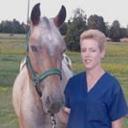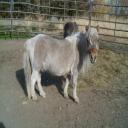Yahoo Answers is shutting down on May 4th, 2021 (Eastern Time) and beginning April 20th, 2021 (Eastern Time) the Yahoo Answers website will be in read-only mode. There will be no changes to other Yahoo properties or services, or your Yahoo account. You can find more information about the Yahoo Answers shutdown and how to download your data on this help page.
Trending News
Rotational deworming horses?
I have heard that rotational deworming with horses is a good way to reassure worms and parasites do not adapt to a certain wormer. What is a good way to shop for dewormers when you plan you to rotate? Can a horse colic if new dewormers are introduced that are different from what the horse usually gets wormed with?
Thanks guys! Best answer gets 10 points!
6 Answers
- CindyRVTLv 76 years agoFavorite Answer
Simple rotational deworming is an old strategy that is no longer recommended by those who study equine parasites. Instead, strategic deworming based on season, age of the horse and the results of fecal egg counts is recommended. This is because the parasites are becoming immune to the commonly used deworming drugs due to overuse, underdosing and ill-timed use. Underdosing can be corrected through the use of weight tapes, weight calculations or scales and careful administration of dewormers. Ill-timed use and overuse is combated through understanding the parasites and the drugs, recognizing that not all horses are at high risk of reinfection or carrying high parasite loads and utilizing the management practices that help limit parasite exposure. For example, when environmental conditions are routinely above 85 degrees and dry, the risk of small strongyle ( the most common parasite for adult horses) infection is greatly reduced. Stalling and dry lotting also greatly reduce the risk of infection. Around 1/2 of adult horses also develop a good immunity to small strongyles and dont' need to be dewormed as often.
For adult horses, the basis of a deworming program should be spring and fall dewormings for seasonal parasites like tapeworms and bots and then deworming at other times based on the results of fecal egg counts. In order for this type of program to be effective, it is important to collect fecal egg counts at appropriate times post-deworming. For ivermectin, fecal samples shouldn't be taken for at least 8 weeks after use. For moxidectin, a minimum of 12 weeks and for pyrantel or strongid, a minimum of 4 weeks after use.
While it is possible for horses to colic with the introduction of any new product, it is unlikely to be simply due to a change in dewormers. This is because the amount of product is small in comparison to how much food a horse eats each day therefore the change in diet is small. It is also possible to have a horse colic due to a large die-off of parasites or inflammation due to the inflammation caused by dying encysted small strongyles when "powerpac" or "powerdose" dosing of fenbendazole is used (this occurs around 2 weeks after dosing).
Getting your veterinarian involved and deworming strategically is the best way to minimize parasites while administering dewormers only as often as necessary.
Source(s): Licensed Veterinary Technician http://www.thehorse.com/articles/28947/why-too-muc... http://www.thehorse.com/articles/36007/rotational-... http://www.thehorse.com/videos/32777/deworming-par... http://www.vet.utk.edu/pdf/Parasites-and-Deworming... - 6 years ago
A veterinarian that I shadow told me that testing for parasites can be done BUT a lot of times if a horse does have worms a fecal egg count WILL NOT WORK as sometimes there will be no evidence in the manure. Rotating dewormers is the best option. My vet does it 3x a year for her horse, using ivermectin two times (one in spring after last killing frost and one in autumn after first killing frost) and some other in the summer. I do ivermectin in the spring (usually in May where I live) and in November; pyrantel pamoate in August, and Fenbendazole in February. The vet for my horse says it's a good schedule. I use these simply because this will get the majority of parasites that affect horses. If tapeworms are a problem in your area, you should do an ivermectin/praziquantel combo once a year. Also maintaining a good sanitary practices (removing manure from horse areas 2x a week at least; removing standing water; etc) will help. Below are links to what anthelmintics (dewormers) kill parasite-wise and other info you may want to know.
Source(s): http://www.merckvetmanual.com/mvm/management_and_n... http://animalscience.tamu.edu/wp-content/uploads/s... - Missy BLv 76 years ago
While Cindy's comment is very true, I have 2 vets and they both still recommend rotational worming because I show and because I travel out to shows, and because we host many events at our ranch. So you never know what other horses are bringing onto the property.
My schedule is based on Quest Plus twice a year, Strongid twice a year, and 2 or 3 doses of generic, cheap Ivermectin in between all that.
In my area I worm with Strongid before the winter and Quest Plus in spring, then probably a cheap Ivermectin, then rotate through.
I worm about 5 or 6 times a year.
- ?Lv 66 years ago
IMHO most likely chance for colic due to worming is when there is a huge die off of parasites. When worming a very infested horse care should be used. Contact a vet for advice and a deworming strategy for your location.
- How do you think about the answers? You can sign in to vote the answer.
- ?Lv 46 years ago
All worming paste's are ONLY 40% effective! To keep your horse worm free effectively
you should give your horse Garlic (powdered) added to it's feed (dosage 50mg per day)
also Garlic WILL keep your horse disease free as a bonus! You pay a lot for a worming
paste that are really only at best 40% good at killing worms!! Garlic IS A LOT CHEAPER
and is 100% effective in killing ALL worms!!
To get it go to Hilton Herbs.com (there are a lot of products that will save you money if
bought in bulk)
Source(s): Horse Master - Anonymous6 years ago
I would recommend getting a fecal exam done on your horse. I have 2 done per year, and the vets give me recommendations on what exactly to do. I feel more comfortable that way, being given guidance on what to do.





